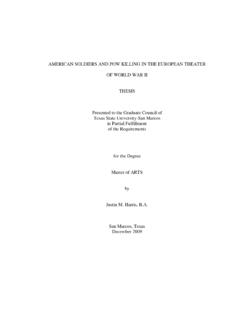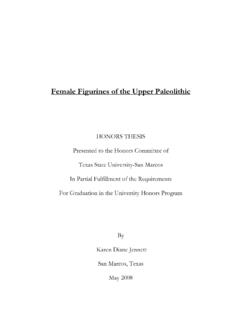Transcription of Gender Differences in Parenting Styles and Effects on the ...
1 Gender Differences in Parenting Styles and Effects on the Parent- Child Relationship Approved: _____ Dr. Heather C. Galloway Director, University Honors Program Approved: _____ Dr. Shirley S. Ogletree Department of Psychology Supervising Professor Gender Differences IN Parenting Styles AND Effects ON THE PARENT CHILD RELATIONSHIP HONORS THESIS Presented to the Honors Committee of Texas State University-San Marcos In Partial Fulfillment of the Requirements For Graduation in the University Honors Program By Meredith Ashley Stephens San Marcos, Texas May 2009 Gender Differences and Parenting 1 Abstract The purpose of this study was to determine if there were any Gender Differences in Parenting Styles and if so, measure how they affect the parent child relationship.
2 Participants were given a survey asking basic demographic questions, questions about which parent/parents they have lived with the most, and questions that related to the Gender roles of each parent. Participants were also given the parental Bonding Inventory that measures maternal care and over protectiveness and paternal care and over protectiveness. There were significant Gender Differences in the ways that parents interacted with their children. For example most young people have been raised by traditional parents and felt closest to their mothers. Mothers on average spent more time with their children in general than fathers, spent more time taking care of their children, were more likely not to work full time, were seen as more overprotective and more caring, spent the most quality time with their children, and still speak to their children more often today.
3 Another Gender difference between fathers and mothers was that fathers were more likely to be overprotective of their daughters than their sons. The results supported traditional Gender expectations, with mothers spending more time with their children and children feeling closer to their mothers when growing up. Gender Differences and Parenting 2 Gender Differences in Parenting Styles and Effects on the Parent Child Relationship Gender roles are beliefs about the ways in which individual, familial, community and societal roles are defined by Gender (Slavkin & Stright, 2000). Traditional Gender roles, which are common in traditional families in which the male is the breadwinner and the female is in charge of childcare and housekeeping, define masculinity as being independent, assertive, and aggressive (Eagly & Steffen, 1984; Eagly, 1987).
4 Femininity is defined as being nurturing, sensitive and emotional (Slavkin & Stright, 2000; Bem, 1981). It is common knowledge that there are often two separate spheres in the household, especially in many traditional marriages between a man and a woman. The man s sphere is usually outside the home in the workplace. The woman s sphere is inside the home taking care of household chores and the children. Families have changed drastically from the stereotypical1950 s stay at home mom and the working dad. Gerson (2002) found that both men and women often expressed strongly egalitarian attitudes toward Parenting . However, even though most mothers from the 1980 s to today work outside the home, there is still what is called the second shift of housework and childcare when the woman gets home from a full day of work (Hochschild, 2003).
5 Mothers, on average, spend more time taking care of children than fathers (Craig, 2006). It may follow that children would feel more emotional closeness to their mothers than their fathers because they have spent more time with their mothers. Folbre et al (2001) said that taking care of children is a complicated mixture of work and love in which the relationship itself is very important. Researchers have Gender Differences and Parenting 3 begun to study the affect of the child s attachment to the father as well as the mother (Thompson, 2000). father s relationships with their children are actually very important, despite what many people may think. According to Dalton III, Frick Horbury, and Kitzmann (2006) reports of father s Parenting , but not mothers, were related to the quality of current relationships with a romantic partner.
6 Also, father s Parenting was related to the view of the self as being able to form close and secure relationships (Dalton et al, 2006). The results of a study conducted by Craig (2006) found that mothers were more likely than fathers to spend not only more time overall with their children, but also more time multitasking, more physical labor, a more rigid timetable, more time alone with children, and more overall responsibility for their care. Craig (2006) also found that these Gender Differences in the amount of time spent with children as well as the circumstances stated above are the same even when the mother works full time. Fathers were found to be more likely to spend time with their children by playing with them, talking with them, engaging in educational and recreational activities more than any other kinds of caring (Craig, 2006).
7 Other research has consistently found that mothers still spend two to three times as much time with children as fathers (Baxter, 2002; Yeung, Sandberg, Davis Kean, & Hofferth, 2001). The reason for the Gender difference in how much time mothers and fathers spend with their children is probably not due to the fact that fathers don t want to spend time with their children. In fact, Milkie, Mattingly, Nomaguchi, Bianchi, and Robinson (2004) found that men said that they wanted to spend more time with their children. Gender Differences and Parenting 4 One common view of mothers is that they are often over involved in their children s lives, while fathers have a much less involved approach, being mostly playmates for their children (Craig, 2006).
8 Also, perhaps it is more acceptable for women to show affection than men, so it might be more difficult for men to show affection towards their sons. Women are often perceived as more nurturing in our society, and many people think that women are better at taking care of children than men are (Craig, 2006). Men and women are often believed to have certain traits that make men more successful in the workplace, and women are better at taking care of children. Pohl, Bender, and Lachmann (2005) found that women tend to show more empathy than men, and men tend to be more assertive than women. People may assume that that finding applies to all men and women and that there cannot be assertive women and empathetic men.
9 Therefore, society often tends to assume that all women should take care of children and all men should focus on work and leave the childrearing to the mother. It is also assumed that mothers should have a closer relationship to their children than the fathers because mothers are supposed to be more focused on their children. For my research I expect that many of the people in this survey were not reared by their fathers, that they did not spend much time with their fathers and that they will have spent more time with their mothers when they growing up than their fathers. I expect this result because many people think that taking care of children is mostly the responsibility of the mother, not the father .
10 Single mothers are much more common than single fathers, and you are more likely to hear of a stay at home mom rather than a stay at home dad. In addition, when two parents of a child divorce each other, I think Gender Differences and Parenting 5 that it is more common to hear of the mother getting custody than the father . Also, I hypothesize that because children spend much more time with their mothers when they are growing up, even if they grow up with both parents in their life, they will be more likely to feel closer to their mothers. Method Participants The participants were Texas State University undergraduates (N= 302, 95 males, 207 females) who participated for extra credit in a sophomore level developmental psychology class.







